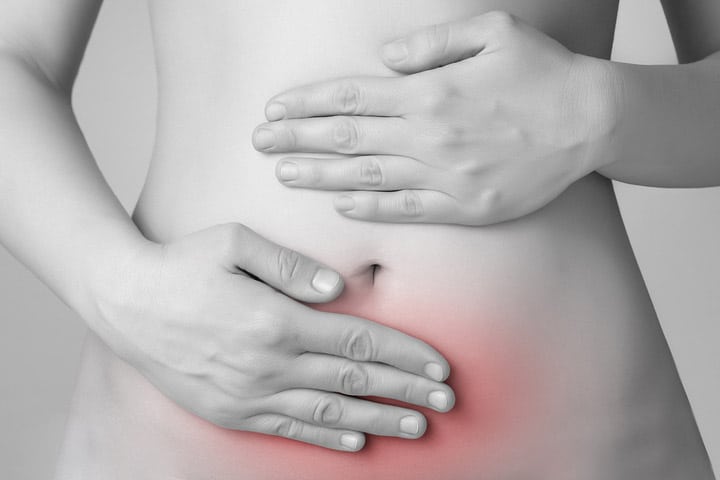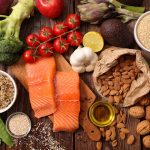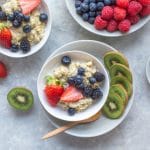Gut health is linked to overall health
Over 70% of our immune system is in our gut microbiome. The bacteria that live there affect how we digest food, how we react to invading diseases, and there’s even evidence that our gut flora impact our heart and mental health.
As such, it’s incredibly important that we keep our gut flora diverse and healthy. With modern life full of stress and poor food choices, your gut flora are under constant attack and strain. When this is going on, our bodies are fatigued and more susceptible to foreign bodies like bacteria, viruses, and parasites.
Luckily there are plenty of small changes you can make to your diet and lifestyle that can have a dramatic effect on your internal health. When your gut is healthy, that health will spread to your entire body. Here are our top 6…
1. Vary your diet
Unfortunately for us, modern diets revolve heavily around highly processed foods, especially sugar. What is quick and easy is often devoid of fibre and nutrition, and so we end up with an overgrowth of one particular bacteria or another. This is because different gut bacteria feed on different things.
By diversifying your diet, you ensure a wide range of healthy, beneficial bacteria that work in harmony with your various bodily systems. This will help improve your immune system, make digestion easier, and combat fatigue.
Eat a variety of fresh fruits and vegetables, particularly local ones that are in-season. If you eat meat, try different kinds from different locations; most people eat a relatively small amount of different animal proteins their entire lives. Trying different types of meats and vegetables will go a long way to diversify your gut biome.
2. Eat plenty of prebiotic foods
There are a lot of probiotics out there in the form of supplements or yogurts, but little attention is paid to prebiotics. Prebiotic foods feed the beneficial gut bacteria, whereas probiotics introduce beneficial bacteria to your system. They both play important but distinctly different roles.
Prebiotic foods are typically fibrous and can’t be digested like normal foods. Your gut bacteria crave these types of fibre and including more in your diet is not just delicious but also highly beneficial. Some prebiotic foods include:
- Legumes
- Apples
- Artichokes & sprouts
- Onions, leeks & shallots
- Asparagus
- Barley
The above list isn’t exhaustive in any way; prebiotics can be found in most fruits and vegetables that have their fibre and skin intact, so adding them to your diet is pretty simple.
3. Eat more fermented foods
Many cultures throughout the world enjoy fermented foods on a daily basis. These are foods that are altered by bacteria to produce something different than where the food started. Some examples are:
- Sauerkraut
- Kimchi
- Yogurt and its cousin, kefir
- Kombucha
There are more fermented foods out there but the overall benefit seems to come from the fact that the process of fermenting these foods requires a lot of lactobacilli. This bacteria is beneficial in general, but particularly because it competes directly with a harmful bacteria called enterobacteriaceae which promotes inflammation.
If you suffer from chronic autoimmune disease or the less-severe but still debilitating irritable bowel syndrome, there is evidence that increasing the amount of lactobacilli in your gut microbiome can improve these conditions. Furthermore, eating yogurt early in life has proven to reduce the symptoms of lactose intolerance which can make life far easier as an adult.
It’s worth noting, however, that most processed yogurts sold at the supermarket will have high amounts of sugar, and excess sugar is bad for your gut flora. It’s advisable to avoid these if possible and select the yogurt with the lowest possible sugar. This way you reap the benefits but avoid the downsides of sugar overload.
4. Take probiotics
Probiotics are different from prebiotics in a very specific way. As we said before, prebiotics feed the beneficial bacteria that are already present in your gut, but probiotics introduce new bacteria to the biome.
Both taken together can work in tandem to improve the overall quality of your gut health. While whole foods such as the aforementioned fermented ones act as a probiotic, you can bump the number of bacteria you intake using probiotic supplements.
There are many probiotic pills on the market but their benefit is not consistent. Instead of colonising your gut, these bacteria can improve your gut health for a short period and are best when taken right after antibiotics of an illness that can alter your microbiome.
When you take probiotics along with a good source of prebiotics, you will see compounded benefits. This is especially true if you’re replacing unhealthy food choices with highly nutritious options that are designed with your gut and overall health in mind.
5. Avoid detrimental foods
Certain foods are actively harmful to your gut bacteria; sugars, alcohol, and artificial sweeteners have all been shown to dramatically damage your bacteria and their habitat. There are other reasons to avoid all of these things, but in particular, their relation to your intestinal health is exceptionally harmful.
- Alcohol – liquor in general irritates the stomach and intestinal lining and cause die-off of certain beneficial bacteria
- Sugar – too much sugar causes an overgrowth of the harmful bacteria that feed on sugar. Moreover, even in cases where harmful bacteria don’t proliferate, the benign-but-not-useful bacteria that eat sugar will crowd out beneficial ones and this is bad, too. Discover how to crush sugar cravings here
- Artificial sweeteners – for some reason, bad bacteria love to munch on artificial sweeteners that are present in most diet sodas. Luckily newer, natural sweeteners based on fermented fruit alcohols are entering the market. Things like stevia are great non-sugar replacements that actually benefit the gut
6. Switch to a ‘largely’ plant-based diet
Plant-based foods, as we’ve said before, are full of prebiotic fibre. While the fibre is great for your gut, the foods themselves are nutritionally dense and low in fat and sugars. Plant-based protein powders are now fairly commonplace, so the concern of not getting enough protein isn’t a reasonable worry anymore.
In fact, eating a largely plant-based diet will help you to hit every one of these tips to improving gut flora:
- A largely plant-based diet is prebiotic-rich
- It allows you to eat fermented foods
- It needs to be diverse in order to hit your nutritional goals
- It will cut out unhealthy added sugars and artificial sweeteners
A final word on gut health
By including prebiotics and probiotics into your diet, and by edging out processed foods in favour of a diverse, largely plant-based nutritional plan, you’re encouraging useful bacteria to stick around. When beneficial bacteria set up shop and raise their little bacteria families, your entire life will bloom with good health. With so much important processes centred around your gut, you owe it to yourself to treat it right.
Want to learn more about gut health from an expert?
Click here to watch, listen or read our interview with Dr. Ruscio who’s best-selling book, Healthy Gut, Healthy You, has paved the way for a ‘start with the gut’ philosophy which has enabled doctors and patient to obtain improved outcomes with minimal expense and effort. In this conversation we discuss the strategies to diagnose issues and then start the healing process within our digestive system.







